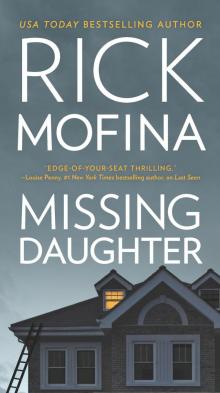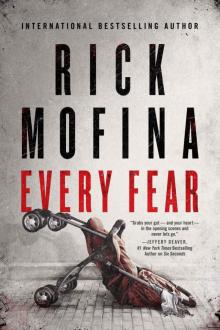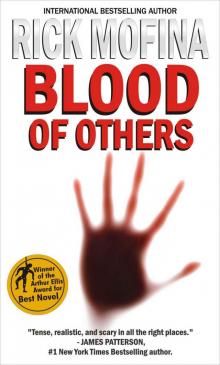- Home
- Rick Mofina
Missing Daughter Page 12
Missing Daughter Read online
Page 12
“It’s my fault, you know.” Tyler lifted his head, brushed away his tears. “Because I should’ve done something, and now we don’t know what’s happened to her.”
“She could’ve run away or something. Wasn’t she always fighting with your mom?”
“Yeah.”
Tyler searched Dalton’s room, his attention drawn to a shelf where there were photos of Dalton meeting a player from the Yankees, then a rock star, then some with his parents in Egypt and London and Disney World. There was a small photo of Dalton, Tyler and Maddie taken at Thanksgiving. Tyler half smiled and allowed the beginning of a laugh.
“You know, I think Maddie likes your hair, said it made you look like a rock star. I think she has a little crush on you. Weird, huh?”
Dalton looked at Tyler, looking at his pictures.
“What, you mean because I’m adopted and not really a biological relative?”
“I don’t know. I don’t even know if the crush thing is true. It’s just weird.”
“Yeah, pretty weird all right.” Dalton went back to his phone. “Hey, there’s a guy tweeting that he thinks Maddie’s disappearance could be related to that halfway house on the other side of the forest.”
“That was on the news. What do you think?” Tyler asked.
“Could be. Could be anything. Remember those girls who live near you said some creep followed them and wanted to know where they lived.”
“Yeah.”
“Tell me again. When police were interrogating you, did they tell you much? What did they ask you?”
“They asked me if I killed Maddie.”
“Seriously? They seriously asked you that?”
“Yes.”
“What else?”
“They asked me if I had ever hurt her, or if any of my friends had ever hurt her.”
“What else did they ask?”
“Different stuff. Like, if I ever hit her, if Mom and Dad fought all the time, if they ever hit me and Maddie, if I ever looked at porn, if I knew our babysitter’s boyfriend...”
“The babysitter’s boyfriend? Why?”
Tyler shrugged.
“What’s his name?” Dalton asked.
“Zachary Keppler.”
“Do they think he’s the guy?”
“I don’t know.”
“What else did police say?”
“They said it was a crime if I lied to them, so I had to tell the truth. They asked me to tell them exactly what Maddie, Crystal—that’s the sitter—and I did last night, then if I heard any screams or noises in Maddie’s room. They asked if I thought Maddie had a secret boyfriend, and if she would tell her best friends about it.”
“Really? What did you say?”
“I said I didn’t know, that maybe it was possible.”
“Do you think this Zach guy was her secret boyfriend?”
“I don’t know.”
“Did the police tell you what they think happened?”
“No.” Tyler turned to the door where his dad and his uncle were standing.
“All right, guys,” Uncle Cole said. “Time to get some rest. We’re going back to the search center in a couple of hours.”
* * *
Alone in his temporary room, Tyler kept a night-light on.
Guilt and fear kept him awake for the longest time as he cried for his missing sister. In the quiet he could hear Dalton talking softly across the hall, and it gave him a degree of comfort.
Dalton must be talking to people, working through the night, trying to help. Tyler was glad they were cousins because not only was Dalton cool, he was so worldly and smart.
He’ll help us find Maddie.
25
The clock above the dry erase board in the meeting room in Syracuse Police Department headquarters read 12:06 a.m.—approximately twenty-four hours since Maddison was last seen.
The odds of finding her alive diminished with each passing minute.
Key facts, updates, questions and names of investigators assigned to tasks were written in block letters filling the board. To one side, easels displayed an array of enlarged color photos of evidence found in the forest behind her home. One easel held a photo of Maddison. Her eyes met those of every detective seated around the table. Most were parents themselves.
Law enforcement from various branches of the Syracuse police, Onondaga County, state police, the FBI and several other agencies were present. Ceramic coffee mugs and takeout cups, phones, tablets, notebooks and fast-food wrappers dotted the table as the first case-status meeting of the task force began.
Stan Zubik led the meeting. “Thank you all for getting us your reports. As you know, not everyone can attend because we’ve got people working through the night. We’ve got a lot of ground to cover here, so let’s get started.”
He went straight to the known facts. Checking his notes, he detailed the time frame of events, including Tyler Lane’s account of hearing voices, up to the point he discovered his sister was missing.
Zubik said that analysis of the mud found in Maddison’s bedroom shows it is consistent with traces found on the ladder and the soil under her window. Partial footwear impressions found under the window were still being processed. No useable latents were recovered from the wooden ladder, but analysis of latents found in the bedroom was ongoing.
“We’re confident someone from the outside entered her room.”
Zubik pointed to photos of a muddied and broken shoelace with pink polka dots, partial shoe impressions and aerial photos pinpointing locations.
“This is what we’ve found in a puddle in the woods known as Lucifer’s Green. The lace and partial impressions are consistent with the size, style and model of Maddison’s sneakers that her mother described. This places Maddison in the woods with the impression pointing northwest, away from her home.”
“Were other impressions found with hers?” Len Reese, a county investigator, asked.
“There were some, but we can’t make any determinations. They’re being analyzed,” Zubik said. “I want to stress this is all holdback. We’ll move on to her last messages, and this is critical.”
Zubik said that Maddison’s phone had not yet been recovered, and it would be an advantage to have it. In working with the Lanes’ cellular service provider, Unidique Global Tele-Systems in Texas, the SPD, New York State and FBI had determined that the last text sent from Maddison Lane’s phone was at 1:47 a.m. Eastern Standard Time yesterday.
“Without the phone we don’t know what that text, or any of them, say,” Zubik said. “As most of you know, most service providers don’t keep the content of phone conversations or messages.”
In the case of the Texas provider, apart from privacy concerns, there were the issues of storage capacity and costs. Consequently, like most major providers, Unidique destroyed its copies of messages after they had been delivered. While Unidique did not keep the content of messages, it did store on its servers records of the parties to a text message, as well as dates and the times they were sent.
What investigators had discovered in Maddison Lane’s case was that the text was the last in an uninterrupted series of exchanges with the same number that began earlier at 10:51 p.m. The number was 555-0116 and prefixed with an area code assigned to New York State. Records from the provider’s server show that Maddison had communicated with the number intermittently over the last three months.
“The mystery number leads to a burner phone and the messages created with an app that had them self-destruct within sixty seconds of receipt. We’re unable to determine the content of the messages or the person behind its number as yet.”
“Have we talked to Maddison’s girlfriends?” Vicky Bishop, with the Family Services Division’s Missing Persons Unit, asked. “I mean, they’d know the boys she likes, or the boys who like her. Have we gone aft
er Maddison’s friends’ phones to see if that mystery number pops up? They might be familiar with it.”
“All valid points, Vicky. That aspect’s being investigated,” Zubik said.
“What about her communication with other people over the months leading to this?” Amy Benton, a state police investigator, asked.
“We have the complete list of numbers and already have determined most as assigned to her friends, family, automated texts from school, gymnastics class, notifications from pop stars she follows, things of that nature,” Zubik said. “We’re still working on the texts and tracking; triangulating cell towers for a geolocator of the burner phone. It’s not emitting a signal, but we’re working on it, focusing on the texts up to the time of her disappearance.”
“Going beyond the phone, who’re we interested in at this stage?” Jan Ford, a Syracuse detective, asked.
“At this stage, we’re interested in everyone.”
“What about the babysitter’s seventeen-year-old boyfriend who was outside her window in the hours before she vanished?” Ford said.
“Zachary Keppler. We’ve questioned him, and we haven’t ruled him out. We’re getting warrants for his phone, home and father’s car. We’ve also searched trash bins near the bus station where we picked him up, and found nothing.”
“What about that halfway house on DeBerry?” Mac Graham, a state police investigator, asked.
“No sex offenders or pedophiles reside at the center. So far, the pass logs and surveillance cameras show all the inmates are alibied. However, Onondaga County’s got a good team helping us there, and we’re still processing the center. So our work there is far from over.”
“And the registry?” an FBI agent asked.
“We’ve got people working on nailing down the whereabouts of every registered sex offender residing in the city and the state,” Zubik said. “It’ll be a lot of work, but we’ll request local law enforcement help us with each offender, checking alibis one by one.”
“What about the Amber Alert and social media?”
“We’re assessing the calls and messages that’ve come in. Nothing concrete or promising so far.”
Going back to his notes, Zubik continued, relating that video from security cameras belonging to the Lanes’ neighbors did not capture the backyard fully or clearly, and consequently showed nothing helpful.
“We’re still processing the Lanes’ house, garage, cars, phones and computers. We’ve also got the trash collection schedule for the neighborhood. Our people will go through everything before it’s picked up.”
Zubik said that friends, relatives, neighbors, teachers, coaches and people who worked with Ryan and Karen Lane, people who know them and their kids, would be interviewed.
“We’re working our way through our list.”
“And where are we with Maddison Lane’s immediate family, their alibis, their background, the atmosphere in that home, Stan?” Paul Murray, a state investigator and old friend of Zubik’s, looked over his bifocals.
Zubik consulted his notes.
“The father, Ryan Lane, age thirty-eight, is owner operator of Lane & Sons Drywall Contractors. Both parents deceased. The mother, Karen Lane, age thirty-seven, employed as cashier at ShopToSave City, both parents deceased. Also, her younger sister died at age ten. Cause was drowning. They are carrying a mortgage, credit-card debt balance and vehicle loans.”
“Appear to be regular working folks,” Murray said.
“Ryan Lane’s got a rich, famous brother. Have we looked into this being a kidnap for ransom of Cole Lane’s niece?” Rob Van Buren, a state investigator, asked.
“We haven’t ruled that out, but no ransom call has come so far,” Zubik said. “Another concern is that there’s tension in the Lane home on several fronts. Ryan Lane’s facing financial strain with his drywall business, and had an outburst at the bank when he was denied a loan earlier the same day. He raised the issue of life insurance policies on his family, including a seventy-five-thousand-dollar death benefit on Maddison.”
“That’s got to raise a flag,” Jan Ford said.
“It does,” Zubik said. “Another troubling aspect is that Maddison has been arguing over the past few months with her mother on the issue of her wanting to date boys, which Karen refused to let her do.”
“Are we going to spitball now, Stan?” Murray said.
Zubik turned to his partner, Fran Asher, and their captain, Moe Tilden, both of whom nodded.
“Go ahead, we’ll open it up,” Zubik said.
“Looking at what we have so far,” said Murray, a case-hardened cop who’d cleared countless homicides, “Maddison was texting with someone she knew, and that ‘someone’ came to her house and left with her. And she left with her phone. That mystery phone number is the key. She knew who came, otherwise she would’ve screamed. Why didn’t she scream?”
“I’ll tell you why,” Asher said. “The intruder could’ve entered quietly, while she was sleeping, and forced her into silence by threatening to kill her family if she did not come quietly. Tyler could’ve overheard that whispered conversation. We know of cases where that’s happened. The intruder takes her phone, wipes it, gets rid of the memory card—essentially erases any record of their relationship.”
“So it’s a stranger rather than someone she knows?” Murray asked.
“She could’ve had an online relationship with a predator posing as an age-appropriate friend in love with her,” Asher said, “say a sex offender, or predatory pedophile in the area, someone who could’ve easily flattered her into thinking she was mature enough for a relationship. Sexting could’ve been involved, and he could’ve guided her in how to keep it all secret, grooming her to agree to a meeting. He could’ve also extorted her, threatening to post her pictures if she didn’t do what he demanded.”
“Then he comes to her bedroom in the middle of the night?” Murray was skeptical. “I still think she’d scream.”
“Not if she was asleep, or he had control over her,” Asher countered.
Captain Tilden leaned forward with his thoughts.
“What do our FBI profilers think?”
“Well, it’s early but based on the facts obtained at this stage,” an FBI agent said, “it’s a strong bet that she was not taken at random, that she was a target with some kind of connection to her abductor. But on the other hand, she could’ve run off, she could’ve orchestrated her own adventure.”
“Agreed,” Vicky Bishop said. “After arguing with her mother, Maddison could’ve summoned a boyfriend to help her escape into the night in an act of defiance, a Romeo and Juliet kind of thing, and now that the situation has exploded, as it were, she’s afraid to come home and face the music.”
Captain Tilden tapped his fingers on the table.
“Let’s consider the statistics. Overwhelmingly, crimes of this nature are committed by a family member. What if Maddison and her mother, or her father or brother, argued? All had reason to argue, the boy thing with mom. Dad’s stressed, short-fused and loses it. The young brother’s owed money, or there’s an offence she’s committed against him. Maddison is accidentally killed, and the parents move to cover it up by staging her abduction. We’ve known of such cases.”
Zubik took quick inventory of detectives around the table weighing speculation against the few facts they had.
“All of these theories are strong, and I’m sure there’re others we haven’t yet considered, but it’s early in the case,” Zubik said. “We have to give serious consideration to every lead, every piece of evidence and every possibility. Nobody and nothing can be ruled out until we have reason to rule them out. We’ve got mountains of work ahead of us, so we’ll close this meeting and get at it again in a few hours.”
26
After the case-status meeting, Fran Asher stopped the unmarked car in front of Zubik’s two-story frame
house.
“What do you think?” she asked her partner.
Zubik took in a long, tired breath and let it out slowly.
“We’ve got to go where the evidence points us, but keep our eyes open to all possibilities.”
Asher reached into the back seat, got her bag, withdrew a slim folder and held it out for Zubik. “You should read this.”
“What is it?”
“Cases similar to ours. It’ll help you keep an open mind.”
Zubik considered the folder, then took it. “All right.”
“See you in three hours, Stan. We’ve got a long list of interviews. Get some sleep and recharge that old brain of yours.”
When Zubik unlocked his front door, the creaking hinges echoed in the darkness. His home was as silent as a mausoleum. He felt a pang of longing for the familiar sound of Lucy’s paws on the floor, her so-happy-to-see-you panting and her unconditional love, because no matter what kind of day he’d had, she’d soothe his heart.
In the kitchen he made a peanut butter and strawberry jam sandwich, got a cold glass of milk and sat at his table. He cut a lonely figure as he glanced at Lucy’s bowls in the corner where he’d kept them like some sort of memorial.
Maybe I am living in a country song. Zubik shrugged as he turned to read the cases while he ate. Some reached back several years. He recalled most of them because of the attention they’d received.
The first happened three years back in St. Louis, Missouri. A twelve-year-old girl, who shared a room with her younger sister, was kidnapped by a man who’d done some contract painting with a crew on the family’s home. He’d entered the home at night through a screen window, threatened the girl with a gun, threatened to murder her entire family as they slept if she didn’t obey him. He’d ordered her to put on her shoes and jacket before abducting her.
The man was delusional. He was convinced the Apocalypse was imminent and wanted the girl to be his bride in what he called, “the new, pure life.” The girl was rescued a year later living with the homeless man on the streets of New York City, physically abused and psychologically damaged.

 The Only Human
The Only Human Tom Reed Thriller Series
Tom Reed Thriller Series![[Tom Reed and Walt Sydowski 04.0] No Way Back Read online](http://i1.bookreadfree.com/05/tom_reed_and_walt_sydowski_04_0_no_way_back_preview.jpg) [Tom Reed and Walt Sydowski 04.0] No Way Back
[Tom Reed and Walt Sydowski 04.0] No Way Back Missing Daughter
Missing Daughter Their Last Secret
Their Last Secret Jason Wade - 02 - Every Fear
Jason Wade - 02 - Every Fear In Desperation
In Desperation Every Second
Every Second Full Tilt
Full Tilt Search for Her
Search for Her The Last Pursuit
The Last Pursuit Every Fear
Every Fear Last Seen
Last Seen The Panic Zone
The Panic Zone The Panic Zone jg-2
The Panic Zone jg-2 Free Fall
Free Fall Blood of Others
Blood of Others![[Jason Wade 02.0] Every Fear Read online](http://i1.bookreadfree.com/i1/03/31/jason_wade_02_0_every_fear_preview.jpg) [Jason Wade 02.0] Every Fear
[Jason Wade 02.0] Every Fear Backup
Backup Perfect Grave
Perfect Grave Into the Dark
Into the Dark Whirlwind
Whirlwind Perfect Grave jw-3
Perfect Grave jw-3 If Angels Fall (tom reed and walt sydowski)
If Angels Fall (tom reed and walt sydowski) Six Seconds
Six Seconds If Angels Fall
If Angels Fall They Disappeared
They Disappeared Vengeance Road
Vengeance Road Before Sunrise
Before Sunrise A Lifetime Burning in a Moment
A Lifetime Burning in a Moment Blood Red Rings (Dangerous Women & Desperate Men)
Blood Red Rings (Dangerous Women & Desperate Men) As Long As We Both Shall Live (Dangerous Women & Desperate Men)
As Long As We Both Shall Live (Dangerous Women & Desperate Men)![[Tom Reed and Walt Sydowski 01.0] If Angels Fall Read online](http://i1.bookreadfree.com/i2/04/12/tom_reed_and_walt_sydowski_01_0_if_angels_fall_preview.jpg) [Tom Reed and Walt Sydowski 01.0] If Angels Fall
[Tom Reed and Walt Sydowski 01.0] If Angels Fall Cold Fear
Cold Fear Be Mine
Be Mine Three Bullets To Queensland
Three Bullets To Queensland